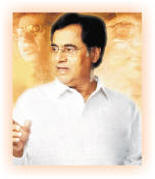|
Jagjit
Singh
was born on 8th February 1941 at Ganganagar, Rajasthan, India. His
father Sardar Amar Singh Dhiman, employed with the Government of India,
hailed from Dalla village in Ropar district of Punjab and his mother
Sardarni Bachchan Kaur came from a deeply religious Sikh family of
Ottallan village near Samralla. His siblings include four sisters and
two brothers and he is fondly called Jeet by his family members.
Although his late father wanted him to become a bureaucrat by joining
the Indian Administrative Service, he was later reported to be happy
with his son's achievements in the world of music. Jagjit went to Khalsa
High School at Ganganagar. He studied Sciences during (after
matriculation) from Government College, Ganganagar and went for
graduation to DAV College, Jalandhar in Arts stream . He also acquired a
P.G. Degree in History from Kurukshetra University, Haryana.
Career
His association with music goes back to his childhood. He learnt music
under Pandit Chaganlal Sharma for two years in Ganganagar, and later
devoted six years to learning Khayal, Thumri and Dhrupad forms of Indian
Classical Music from Ustad Jamaal Khan of Sainia Gharana. The Vice
Chancellor of Punjab and Kurukshetra University, Late Professor Suraj
Bhan encouraged his interest in music. He arrived in Mumbai (then
Bombay) in 1965 in search of better opportunities as a career musician
and singer. His early struggle in the music industry, though not too
harsh by his own account, still had its share of trials and
tribulations. He lived as a paying guest and his earlier assignments
were singing advertisement jingles or performing at weddings and
parties.
Rise of Jagjit Singh
During 1970s, in India, the art of ghazal singing was dominated by
well-established names like Noor Jehan, Malika Pukhraj, Begum
Akhtar,Talat Mahmood and Mehdi Hassan. However, Jagjit was still able to
make his mark and carve out a niche for himself. In 1976, his album The
Unforgettables (On HMV LP Records) hit the music stores. Essentially a
ghazal album, it's emphasis on melody and Jagjit's fresh voice was a
departure from the prevalent style of ghazal rendition, which was
heavily based on classical and semi-classical Indian music. Sceptics had
their own reservations, purists scorned it but it was widely successful
among listeners and the album set new sales records.
Family
In 1967 he met
Chitra, also a singer, while doing jingles. After a two
year long courtship they got married in 1969. They epitomise the first
successful husband-wife singing team. Jagjit Singh, with Chitra, has
contributed immensely towards changing the course of this genre of music
known as 'Ghazal' making it more ear friendly, melodic and enjoyable by
a wider audience.
Later successful releases of the duo include Ecstasies, A Sound
Affair and Passions.
While the above-mentioned albums were breezy, Beyond Time released in
the opening years of nineties was an experimentation with sounds and
conveyed a feeling that was beyond space and time.
Around this time the duo was struck by grief as their only son,
Vivek,
who was twenty-one, met an untimely death in a road accident. Not only
Jagjit and Chitra, it was a big shock to his numerous fans also. The
album is a tour to the soul, ethereal, conscientious and introspective.
The ghazals have a moving quality to them since they express the
personal loss of Jagjit and Chitra. 'Someone Somewhere' was the last
album containing ghazals sung by both. After that, Chitra quit singing.
The Creator
Jagjit Singh is also accredited with bringing the ghazal genre, which
was previously restricted to the elite classes, to the masses. His music
direction can be seen to be pioneering in changing the sound layout by
adding more Western instruments while mostly retaining the traditional
orchestra (which includes a tabla, and harmonium, and a couple of string
instruments) among his
crew. |

